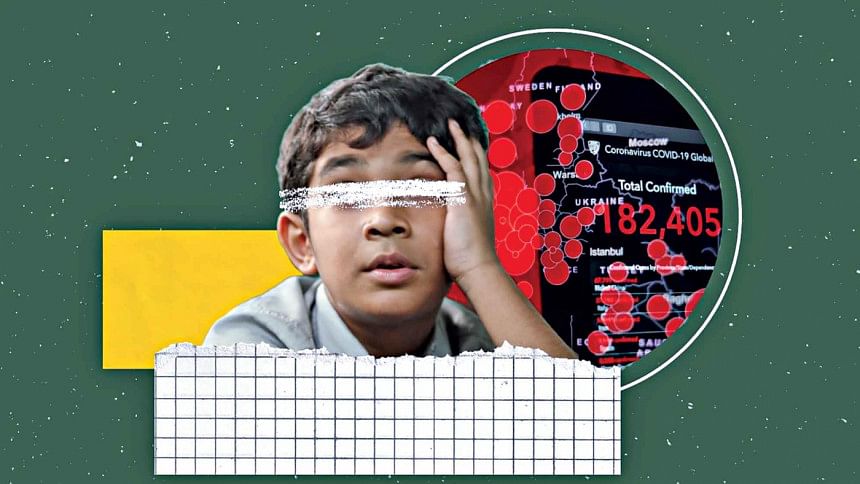How the pandemic and online learning has affected school students

The perennial pandemic has taken a heavy toll on all of our lives. School-going children are not spared from this atrocity either. The invisible enemy has stolen their livelihood and childhood. With the closure of academic institutions since March last year, the education system had a bumpy shift to online methods.
Students, ranging from preschool to high school, now have to rely on gadgets to acquire their education to keep up with their global peers. This overdependence on electronic devices has given rise to an unhealthy amount of screen time, which is detrimental to young eyes and restricts their social and psychological development.
Adding to the adversity, teenagers who spend most of their time in front of screens, more often than not, fall victim to the bullying in the virtual space and thus suffer from mental health issues such as depression, anxiety, inferiority complexities and so on. As a result of these unconventional and novel education methods, students spend most of their time either sitting or lying down. Coupled with unable to indulge in outdoor activities, courtesy of the lockdown, this is the cornerstone to obesity and other health issues like dorsal pain, insomnia, and coronary diseases.
The pandemic has narrowed down recreational activities to almost zilch. Refrained from playing outside, young adults and children seek asylum in online games, movies, TV shows, and other online-based communal activities, looping towards more screen-time.
Atandrila Saha, a student of S. F. X. Greenherald International School, says, "I can neither meet my friends and cousins nor participate in extracurricular activities or sports. Students my age have to pass their time on phones and laptops, thus becoming dependent."
"Concentrating on studies and the sense of competition is tough on us. Many suffer from economic issues and cannot afford updated gadgets to support classes. There are good sides, too. People not habituated with technology are learning how to use digital platforms like Zoom that can be beneficial in the future," she adds.
The fundamentals of education are taught at school at a primary tier. Students making it through the pandemic have an arduous time grasping the basics of teachings because many things demand exclusive attention, such as mathematical principles or scientific-practical experiments that require laboratory apparatus, which is often not pragmatic through online classes.
Moreover, in the light of social distancing, all national and international board examinations were cancelled. This hinders students' chance at a fair evaluation of their quotient. Many schools have opted out for assignments as a substitute to holding exams to avoid questioning honesty as it is no sweat to adopt below the belt measures in this era of internet and available resources.
Md. Ashik Uz Zaman Raj, a professional tutor, outlines how teaching has drifted away from conventional techniques. "Online-based teaching was exceptionally new to me. Being an educator, collaborating with students motivates me to carry the lesson forward, so it was quite difficult to deliver lectures for hours without having any live interaction. Additionally, it took a great deal of time to figure out effective teaching strategies and with online classes, I have to try harder to keep students focussed to bring out the best in them which, at the end of the day, is my responsibility," he says.
Parents are equal victims of these challenging circumstances. Tahmina Mahmud, a mother of two and a businesswoman herself, finds it difficult to focus on her business. She says, "My kids have different, unrealistic schedules and since everything is online, I have to solely take care of their classwork and homework as devices are cumbersome for young kids. It has been over a year since they attended school; therefore, they miss out on making new friends."
She is worried about her children's mental health as well. "They miss out on interactive classes and recess that encourage them. Their and our mental health are in shambles as there is very little time for ourselves since we mothers manage this extra load without a break tirelessly," adds she.
Fariha Tasnim, Assistant Professor at Jagannath University and a concerned mother, thinks the evaluation system is a misrepresentation of merit. "Instead of holding exams that might display dishonesty, if there is a daily evaluation based on the discussions/short quizzes of the class content, students will be obliged to concentrate," she says.
"Physical classes assure full concentration and routine. Lackadaisical students often miss classes, something which is strenuous on their academics. Teachers cannot keep track whether an individual student is distracted," she adds. However, she firmly believes online classes are the lone option available in these unusual times and we have to make the best out of it.
To escape this sedentary lifestyle, most experts recommend cultivating offline reading habits, befriending old board games, focusing on hobbies like painting or trying hand at learning something new. Platforms like Coursera have done a tremendous job in this pandemic to bring about online courses which help build skills and extracurriculars, some of which are worth checking out in free time.

 For all latest news, follow The Daily Star's Google News channel.
For all latest news, follow The Daily Star's Google News channel. 



Comments